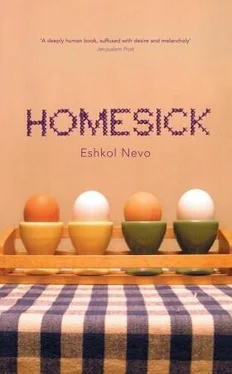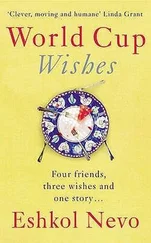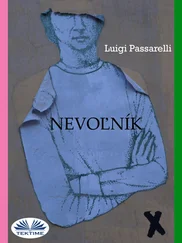Eshkol Nevo - Homesick
Здесь есть возможность читать онлайн «Eshkol Nevo - Homesick» весь текст электронной книги совершенно бесплатно (целиком полную версию без сокращений). В некоторых случаях можно слушать аудио, скачать через торрент в формате fb2 и присутствует краткое содержание. Год выпуска: 0101, ISBN: 0101, Издательство: Random House, Жанр: Современная проза, на английском языке. Описание произведения, (предисловие) а так же отзывы посетителей доступны на портале библиотеки ЛибКат.
- Название:Homesick
- Автор:
- Издательство:Random House
- Жанр:
- Год:0101
- ISBN:9781448180370
- Рейтинг книги:5 / 5. Голосов: 1
-
Избранное:Добавить в избранное
- Отзывы:
-
Ваша оценка:
- 100
- 1
- 2
- 3
- 4
- 5
Homesick: краткое содержание, описание и аннотация
Предлагаем к чтению аннотацию, описание, краткое содержание или предисловие (зависит от того, что написал сам автор книги «Homesick»). Если вы не нашли необходимую информацию о книге — напишите в комментариях, мы постараемся отыскать её.
Homesick
Homesick — читать онлайн бесплатно полную книгу (весь текст) целиком
Ниже представлен текст книги, разбитый по страницам. Система сохранения места последней прочитанной страницы, позволяет с удобством читать онлайн бесплатно книгу «Homesick», без необходимости каждый раз заново искать на чём Вы остановились. Поставьте закладку, и сможете в любой момент перейти на страницу, на которой закончили чтение.
Интервал:
Закладка:
Moshe hears the words, but he’s preoccupied with last night’s fight and he doesn’t really absorb what they’re talking about. He waits impatiently for the lesson to be over and for the last student to go out. When they’re alone in the room, he pulls a chair over to his brother’s desk and looks at him, his eyes filled with gloom. His brother asks: is everything all right? No, Moshe replies, too tired to pretend. Now he tells Menachem the whole story from beginning to end. How Sima went to the kindergarten. And how she came back. What he said to her. What she said to him. How he put the glass under his foot and smashed it. When he comes to the part where Sima threw him out of the house, his voice cracks. It’s so hard to tell his brother these facts. But still, he plunges ahead: the bitter cold, the newspaper landing on his head. When he’s finished, he feels as if he’s run a marathon. All his strength is gone. He looks up at his brother: If you don’t help me, I can’t go on. Please give me some advice, and if possible, don’t quote some biblical verse that has more than one meaning, because the situation at home is getting worse. Menachem, who’s been silent till now, forgives his brother for his remark about the verse. He simply strokes his beard and shakes his head to some hidden tune. So what do you think you should do, he asks, and the question hangs in the air of the room. Moshe replies: I don’t know. Otherwise I wouldn’t have come here. Maybe I should take the boy to that kindergarten without asking her if I can? Maybe I should keep sleeping outside till she realises she’s made a mistake? I even thought of leaving the house tomorrow morning without giving her any warning. Leave the house? Without any warning? Menachem says, raising his voice, and Moshe recoils in alarm. Then he repeats his threat, but less convinced this time. Yes, leave. You don’t think it’s a good idea, Rabbi? And Menachem stands up, walks around the desk and bends forward until his face is close to his brother’s. Tell me, brother, without meaning any disrespect, did you hear what you said? Have you completely lost your head?
*
The first to greet me is Mordechai. He’s waiting impatiently in front of the entrance to the shelter, holding a photo album. I already know that the album contains pictures from his glory days as a goalkeeper for Ramat Amidar’s junior team. With the ball, without the ball, leaping across the goal, hugging the goalpost. And one picture of him with his father, after a game, their arms around each other’s shoulders, looking alike the way only a father and son can. Mordechai doesn’t remember that he’s already shown me the album several times, and he doesn’t remember my name either. He has some idea that I’m one of the student volunteers. But that’s all. When I cross the street and approach him, he introduces himself, asks if I’m on my way to the club and then opens the album for me. I listen patiently to his explanations — here we were playing against Bnei Yehuda, here I caught a ball that would’ve been a goal for sure — and I know that when he gets to the picture of him with his father, he’ll stop, look all around as if he’s revealing a top-security secret and then he’ll tell me about the night his father had a heart attack and he, Mordechai, the son who was always sick, suddenly had to do everything himself: call an ambulance, give his father artificial respiration according to the instructions they gave him on the phone, go to the hospital, wait on the bench outside the emergency room. Maybe you can tell me the rest inside the club, I suggest, taking a quick look at my watch. Nava the co-ordinator doesn’t like us to be late. Not that she’s openly angry at them, that wouldn’t be ‘psychological’ on her part. But she has her ways — a look here, a word there — to make you feel like a traitor. Mordechai refuses my invitation. He’d rather breathe a little more fresh air outside. He’ll probably try his luck again on the next person to arrive.
I open the iron door and start walking downstairs.
My steps are heavy, hesitant. My shoulders are stooped. Over the years and all the times I moved, I’ve discovered that I have two noticeably different ways of walking: the tense, stiff way when I hold all the air in my chest — the way I walk when I’m in a new place; and the open, confident walk when I throw my legs forward nonchalantly — the way I walk after I learn the rules and see that things aren’t as bad as I thought.
Inside, a strong odour assails me. Over the next few hours, my shirt will absorb it and then Noa will wrinkle her nose when I come into the house. It’s hard to describe that smell: cigarettes, sweat, but something else too, something unique to that place. Maybe loneliness. Joe is the first one to come over to me, waving a draughtboard. Wanna play? Since Dan was hospitalised, Joe has been my partner. He mops the floor with me. If draughts were an Olympic sport, the man would have a medal. Our games don’t usually last more than a few minutes, and between games, I try to get him to talk so I can understand what brought a man like him, who looks like an accountant, to a place like this. It was most likely a crisis with his ex-wife, but he doesn’t volunteer any details. Hold on a second, I say to him, I just got here. Let me put my things away. He takes a step back. I take a quick look over his shoulder and see that Shmuel isn’t there. I’m relieved and disappointed at the same time.
Nava and the other two students are standing in the other, smaller room. Right on time, Nava says. Somehow, coming from her, it sounds like an accusation. I walk past them and lean my bag and the big, card crossword puzzle against the wall. In our opening talk, Nava explained that each one of us had to organise an activity that involved something we’re interested in. Chanit jumped in and said she wanted to give a cooking course. Ronen, who’s also studying computer science, suggested something that had to do with science and I said I’m interested in lots of things, but none of them seem right for an activity here so I said I wanted to think about it. Nava raised a plucked eyebrow. Amir, she said, you should take into account that activities begin next week. No problem, I said, but it stressed me out a little. What’ll happen if I don’t get an idea? What am I, an idea man? It’s a good thing I have Noa at home. She has that ability to come up with nice, simple ideas like the kind that make you say, ‘How come nobody thought of that before?’ A crossword puzzle, she said. And she was right. The crossword puzzle idea turned into a great success, and even Nava, who didn’t show any particular enthusiasm at the beginning, was forced to admit that it was interesting to see how they co-operated with each other. Every week, I had to think up harder and harder clues to challenge the participants, whose number was increasing. Occasionally, they had surprising solutions that challenged me too. For example: Five letters, ending in y , what you feel when you do something wrong. Sorry? No. Worry. Or: Five letters, with an e in the middle, what you do when you’re not awake. Sleep? Of course not. Dream.
Shmuel only came to the first meeting of the crossword puzzle group. I think it’s childish, he explained. He was more interested in conversing (not in ‘talking’, but in ‘conversing’. He, like me, prefers beautiful words.)
Is Shmuel coming today? I ask Nava, and she nods. Yes, he went to the shop to buy milk for coffee. It’s his turn. Interesting, he asked about you too. What’s so interesting about that, I think. What?! I hate that remote, insinuating tone of hers. But I don’t say a word. She has to give us recommendations for a Master’s programme at the end of the year.
I already know that Shmuel will be waiting patiently for me till the crossword puzzle group breaks up for the day. He’ll sit in a corner, drink tea and he won’t talk to any members of the group. Every once in a while, he’ll smile, sometimes at a joke someone tells, sometimes at a silent, internal joke. Every once in a while, he’ll clean his scratched glasses on the collar of his shirt. When we’re finished, he won’t come right over to me, but he’ll give me time to roll up the card, to wash my face in the bathroom and have a short conversation with Chanit and Ronen. He’s in no rush. He knows that in the end, I’ll go over to him. He already understands how attracted I am to his complicated theories, to nice words. I’ve been musing over our last conversation: Amir, he’ll tell me when I sit down next to him, thereby cleverly touching on another one of my sensitive points: my need for continuity, my sense that there’s a point to all our conversations. Share your musings with me, I’ll reply, and rest my chin in my hand as a sign that I’m listening.
Читать дальшеИнтервал:
Закладка:
Похожие книги на «Homesick»
Представляем Вашему вниманию похожие книги на «Homesick» списком для выбора. Мы отобрали схожую по названию и смыслу литературу в надежде предоставить читателям больше вариантов отыскать новые, интересные, ещё непрочитанные произведения.
Обсуждение, отзывы о книге «Homesick» и просто собственные мнения читателей. Оставьте ваши комментарии, напишите, что Вы думаете о произведении, его смысле или главных героях. Укажите что конкретно понравилось, а что нет, и почему Вы так считаете.












